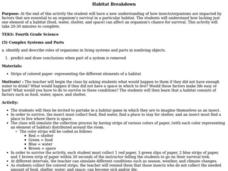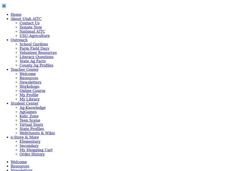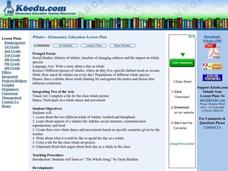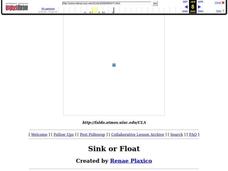Curated OER
Learning From Leaves: Adaptation Scavenger Hunt
Young scholars participate in an adaptation scavenger hunt at. They obtain various plant specimens, and sort the plants based on whether they came from a desert, tropical rainforest, or wetlands.
Curated OER
DID YOU HELP CREATE THIS
Students examine whether their actions are positively or negatively affecting organisms and their habitats. They choose an animal to study then create a multimedia presentation including charts and graphs of data logger information and...
Curated OER
Polishing the Petoskey
Students select a stone and polish it. Throughout the process they demonstrate an understanding of rocks and fossil formation.
Curated OER
Making Community Measurements: Which Plant Part?
Learners identify a plant in a given community and make a variety of measurements. They determine how a plant meets its basic needs. In addition to identifying plant parts, they observe seasonal change and compare plants within a community.
Curated OER
Polishing the Petoskey
Students polish a Petoskey stone to show how to make an attractive rock display. In this polishing rocks lesson plan, students use sand paper and polishing materials to polish a rock and remove the rock dust. This is to display a nice...
Curated OER
Biotic Factors
Students identify individual organism, a species, and a population within the study community. They identify biotic factors at the site and attempt to characterize the site's species diversity.
Curated OER
From Lake to Lake
Fourth graders investigate the formation of the Great Salt Lake. They conduct research using a variety of resources. The information is used to construct a timeline of the history. Each phase of history should include facts and...
Curated OER
Food and Fiber: Helping the Environment and You
Fourth graders explore the many uses of corn-based products and the importance of water resources. They consider how biodegradable products help to keep water clean. They perform experiments to observe how corn pellets dissolve while...
Curated OER
Habitat Is Home
Students are introduced to the concept and components of a habitat. They discuss the key components of a habitat and describe how certain factors can cause disturbances in a habitat and change its population. Activities are leveled for...
Curated OER
Investigating Animals in Water
Learners observe small animal activity. They identify local water animals and describe the habitats where water animals can be found. Students collect samples to observe in the classroom.
Curated OER
"To Terraform or Not to Terraform?"
Students analyze an article written by an engineer at NASA proposing colonizing Mars with human explorers on the fastest track possible. They are invited to react to the article through several activities.
Curated OER
Trail Adventure
Pupils create a trail with numbered specimens. Students complete an accurate and functional interactive trail activity brochure. They complete a web page tree identification guide and interactive identification activity. Pupils answer...
Curated OER
Habitat Breakdown
Fourth graders gain an understanding of how insects/organisms are impacted by factors that are essential to an organism's survival in a particular habitat. They see how lacking just one element of a habitat can affect an organisms chance...
Curated OER
"For the Birds" [part I]
Students identify birds that appear in Chinese and Japanese art, learning about
their physical characteristics, classifying them according to scientific principles, and exploring their habitats and migration patterns. This is part one...
Curated OER
Owl Pellets: A Fowl-Up, Chuck!
Young scholars discover the world of owls as predators. After watching a video of owls hunting and eating, are introduced to owl pellets. Students dissect their own pellet and match the prey's bones to a bone diagram.
Curated OER
Ride the Wild Leaf Cycle
Fourth graders explore plant life by completing an Internet activity. In this botany lesson, 4th graders identify the types of plants that grow locally and the different soils they utilize to survive. Students read assigned text about...
Curated OER
Planet/Constellation Mobile
Pupils, through small group discussion, identify and share a rationale for shapes and patterns in the construction of a mobile that represents the solar system that makes them think of the creation of our solar system.
Curated OER
Parasites: Our Tiny Companions
Students consider parasites that seek human hosts. They prepare nutrient agar plates and cultivate samples of bacteria taken from their own bodies. They experiment with disinfectants and soaps to determine which method kills the most...
Curated OER
Fossil Footsteps
Fourth graders create their own dinosaur tracks using clay. In addition, 4th graders compose a story about the dinosaur / animal who created the tracks. They study photographs of dinosaur tracks before beginning.
Curated OER
Advantages and Disadvantages of Technology
Students imagine a time when there was no electricity. They work in small groups to list as many inventions as they can and discuss lists and have student groups choose two or three inventions and explore the disadvantages and advantages...
Curated OER
Precious Water: Is it a Need, a Right, or a Commodity?
Students determine whether water is a need, a right, or a commodity. In this water lesson, students investigate land and water ecosystems through activities. Students also discover water as a resource and energy source as they observe...
Curated OER
Whales
Learners study the history of whales. For this whale lesson plan, students research two types of whales, color a tile, and write a one page paper. The tiles may be combined to make a group picture.
Curated OER
Termite Trails
Students observe the behavior of termites and draw conclusions about their behavior. They record data as to termite behavior and recognize elements in the experimental design which must include a hypothesis.
Curated OER
Sink or Float
Students construct clay boats and predict whether the boats will sink or float. Students will hypothesize what caused the boats to sink or float.













!["For the Birds" [part I] Lesson Plan "For the Birds" [part I] Lesson Plan](http://content.lessonplanet.com/resources/thumbnails/122462/large/cgrmlwnvbnzlcnqymdeymtaxny0ynji5lwd4n2h5by5qcgc.jpg?1414222903)









